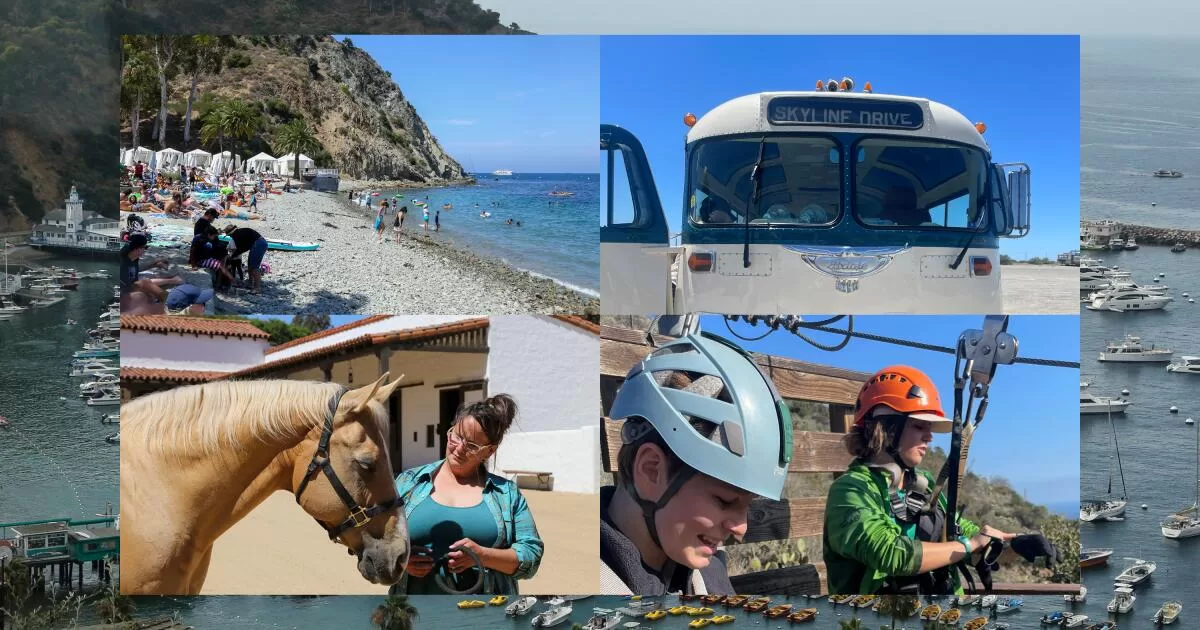In the center of Catalina Island is Bishop’s Chapel at El Rancho Escondido. From its coastal perch, the small adobe building is alone with scrub-covered hills that look as if they are rolling into the distant rugged shoreline. The blue sky above is mirrored in a vast stretch of ocean. This could be a scene from rural Spain or Italy, and if it were springtime, the green isle of Ireland. But this is, by technical definition, greater Los Angeles. Those basking in the scenery — including myself — can’t quite believe it.
Visiting the recently renovated ranch is one of the many new and under the radar experiences around Avalon, Catalina’s largest town with just over 3,000 people. If you haven’t made a trip in a while, it’s time for a reintroduction.
This little getaway across the channel has been attracting visitors for over a century. Longtime Avalon resident and musician Vern Altieri found his place in this community after living in Malibu for 20 years. He explains, ”There’s no traffic light. There’s no traffic. There’s one store for shopping and just one gas station. It’s just one mile square and people come here from all over the world for a good time. I love it.”
With strands of hair framing his face, he lights up to talk about his music, which he played every Friday night at the Marlin Club (Avalon’s oldest bar) prior to the pandemic with his classic rock band, the CIA. Whether intentional or not, the name, which stands for the Catalina Island Allstars, is a sly nod to the Central Intelligence Agency, which has early roots on the island.
In fact, Avalon is a formative place for many, including celebrities, industries and new ideas. Ronald “Dutch” Reagan came to the island as a young radio announcer for the Chicago Cubs and Norma Jean Dougherty lived in Avalon for a time, before she became known as Marilyn Monroe. The island’s remote location also spurred innovation in radio and wireless technology, its South Seas look attracting early Hollywood films and the Catalina Casino housing the world’s first theater made for talkies. And the growth of Avalon’s hospitality scene brought about Southern California’s first golf course and helped to introduce the world’s first successful glass bottom boat.
The Wrigley family, of chewing gum fame, was instrumental in much of this development. Heirs are still deeply involved in the Catalina Island Company, which runs many of the island’s hotels, restaurants and adventure activities. Whether it was the manufacturing of Catalina tile, bringing the Chicago Cubs team in for spring training or the development of its buildings and early adventure touring, William Wrigley, Jr. had his hand in just about everything.
As a wealthy magnate, Wrigley could have gone just about anywhere in the world. But, as his great grandson-in-law, Geoff Rusack, told me, “If you were to spin the globe and put a pin on the best place to be, Avalon would likely be it.”
With its temperate climate, proximity to Los Angeles, quaint European feel and world-class location for adventure and water sports, this is a hard premise to argue.
Tips for visiting Catalina:
Book your trip early. Resort towns tend to run on a seasonal schedule, and Avalon is no different. Summertime is peak season, and weekends, as expected, can get booked out quickly, including the Catalina Express, which offers daily departures from Dana Point, Long Beach and San Pedro.
Decide how you’ll get around town. Golf carts have long been a fun go-to mode of transport, and an activity in itself. But you can also book the city’s all-electric public transportation system called COAST, which works like an on-demand ride share for $2 per person per ride on the Ride Circuit app. It’s highly affordable, efficient and doesn’t make you feel rushed at far-flung attractions to get back to town before your rental period is over.
Several off-the-beaten-path businesses have complimentary shuttle service, like the family-owned local favorite, Buffalo Nickel restaurant, where you can eat a buffalo burger or sip on a buffalo milk cocktail under the gaze of a stuffed bison. (Yes, wild bison roam the island.)
To get some cultural context, start with the Catalina Museum for Art and History. Upon arrival to a new destination, some travelers head straight to the local museum. On Catalina, this is a great travel hack, given the island’s extraordinarily rich history.
